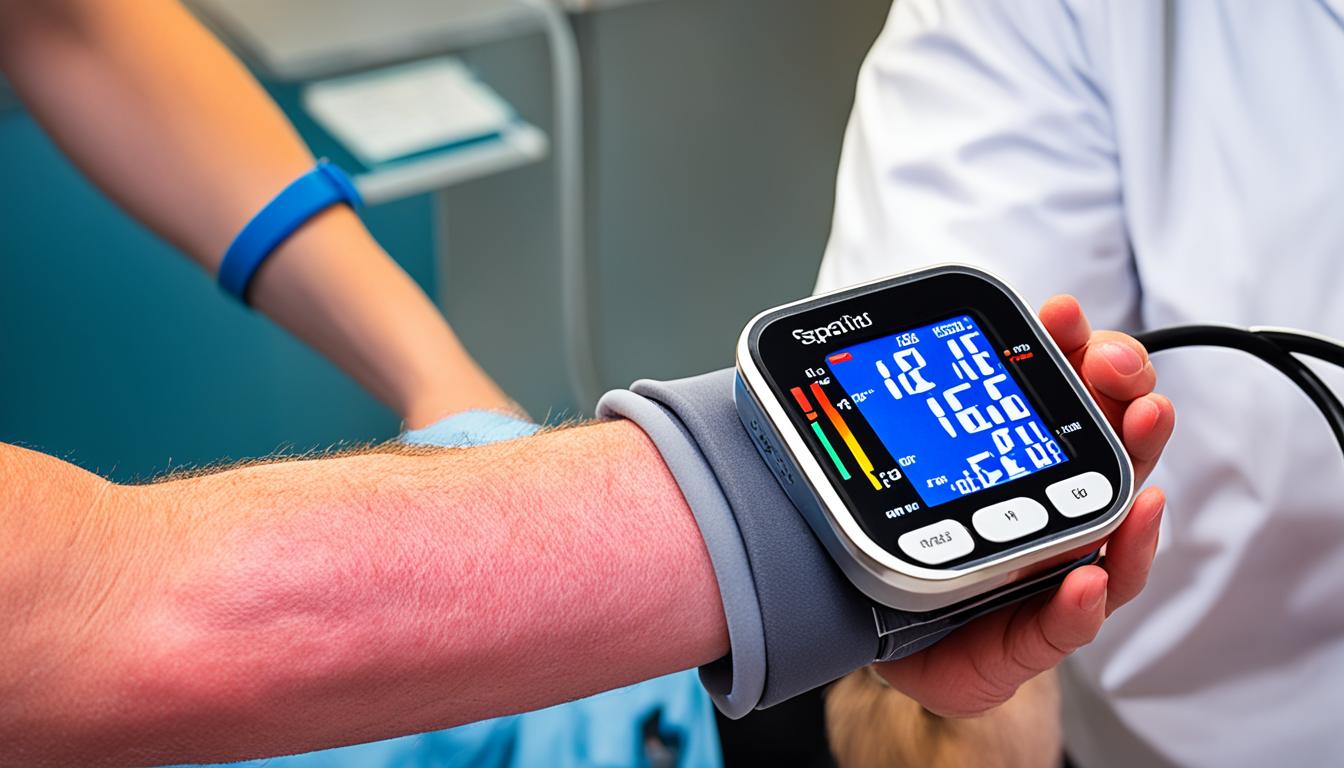High blood pressure, known as hypertension, is a serious heart disease. It affects about 1 in 5 adults in Thailand, or around 12 million people. Often, it has no clear signs, which is why it’s called a “silent killer.” Hypertension makes the heart work harder and can cause stroke, heart failure, or heart disease.
To stay healthy, it’s important to manage your blood pressure. This means making changes in your life, like eating better and moving more. Also, taking medicine your doctor gives you is important. People with high blood pressure should take their medicine and check their levels often.
Key Takeaways:
- High blood pressure, or hypertension, is a common cardiovascular disease affecting millions of people in Thailand.
- Hypertension is often asymptomatic, making it important to regularly monitor blood pressure levels.
- Lifestyle changes, including a healthy diet and increased physical activity, can help manage and lower blood pressure.
- Medication prescribed by healthcare professionals is an important component of hypertension treatment.
- Regular check-ups and comprehensive medical evaluations are crucial for early detection and effective management of high blood pressure.
Hypertension Symptoms and Treatment
Hypertension is high blood pressure and often doesn’t show symptoms. This makes it hard to find. Having high blood pressure can lead to serious issues like strokes and heart attacks. On rare occasions, you might notice some signs telling you about the problem.
Symptoms of Hypertension
People feel different signs when they have hypertension. Some signs might not even seem related to high blood pressure. But, the top symptoms are:
- Headaches: Major or ongoing headaches could mean you have high blood pressure. However, they might be from something else too.
- Shortness of breath: Trouble breathing, especially while being active, could point to hypertension. It may also be a sign of other health problems.
- Nosebleeds: Some nosebleeds can happen to anyone and aren’t serious. Yet, if they’re often or heavy, it could mean your blood pressure is high.
Remember, these signs could be from many things, not just hypertension. That’s why check-ups and keeping track of your blood pressure are so important.
Treatment for Hypertension
Controlling hypertension usually means changing your lifestyle and taking medicine. The aim is to lower your blood pressure and stop complications.
Lifestyle changes:Lifestyle changes can really help lower your blood pressure. This includes:
- Eating a diet that’s low in salt, fats, and cholesterol.
- Being active regularly.
- Quit smoking and cut back on alcohol.
- Reducing stress with activities like meditation.
- Getting enough sleep and keeping a healthy weight.
Hypertension medication:Sometimes, lifestyle changes are not enough. In these cases, doctors may give you medicine. Such drugs include:
| Medication Type | Examples |
|---|---|
| Diuretics | Hydrochlorothiazide, Chlorthalidone |
| Angiotensin-Converting Enzyme (ACE) Inhibitors | Lisinopril, Enalapril |
| Angiotensin II Receptor Blockers (ARBs) | Losartan, Valsartan |
| Beta Blockers | Metoprolol, Atenolol |
| Calcium Channel Blockers | Amlodipine, Nifedipine |
Always talk to your healthcare provider about the best plan for you. Regular check-ups and maybe changing your medicine over time are key to keeping your blood pressure in check.
Stem Cell Therapy for Hypertension
Stem cell therapy is showing promise in treating hypertension. It’s especially helpful for those who don’t react well to usual meds or face side effects. This approach uses mesenchymal stem cells (MSCs) to help fix damaged blood vessels in the heart and lungs. This repair might lower high blood pressure.
MSCs are special because they can turn into different cell types. This includes cells that help form and work blood vessels. By doing so, MSCs can improve cardiovascular health and help bring blood pressure back to normal. Doctors aim to solve the root problems of hypertension, not just its signs. This could be a big step in how we tackle this health issue.
The therapy process starts with getting MSCs from the patient’s bone marrow or fat. These cells are then placed into the areas that need help, like the heart. This step is meant to fix and regrow tissue. Studies have shown that some patients feel better and have better control over their blood pressure after this treatment.
But, stem cell therapy for high blood pressure is still being studied. It isn’t a main treatment yet. However, it offers hope for those looking for different ways to deal with heart issues. It could be an important part of the future of heart medicine. As scientists learn more, using stem cells might become a common way to fight hypertension and its causes.

